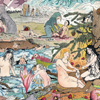 Natural Snow Buildings seem to be currently locked in a rhythm in which they release one truly monster album each year and Solange Gularte's latest solo effort seems to have possibly secured that honor for 2012 right out of the gate.  More remarkable than the album's quality, however, is how restless and adventurous Solange has been in tweaking her sound.  This sounds almost nothing at all like her last album (2010's Modlitewnik) and makes some bold and somewhat surprising changes to her expected aesthetic.
Natural Snow Buildings seem to be currently locked in a rhythm in which they release one truly monster album each year and Solange Gularte's latest solo effort seems to have possibly secured that honor for 2012 right out of the gate.  More remarkable than the album's quality, however, is how restless and adventurous Solange has been in tweaking her sound.  This sounds almost nothing at all like her last album (2010's Modlitewnik) and makes some bold and somewhat surprising changes to her expected aesthetic.
In the past, I have mentioned how Natural Snow Buildings' lengthy "dream-drone" pieces were beginning to yield diminishing returns for me due to the sheer volume of them that I have absorbed over the last few years.Perhaps Solange was experiencing a similar effect herself, as she limits herself to just a few such pieces here and two of them are absolutely amazing.  "Lost Girls" and "Spine of the Night" essentially bookend the album (there is a brief coda following the latter) and they easily rank among the best drone pieces that Gularte has composed.
"Spine of the Night" is the more mesmerizing of the two, as it is a billowing, shimmering, hallucinatory cloud of bliss with just enough metallic buzz, clatter, buried snarl, and unpredictability to imbue it with serious heft and depth.  Also, it undulates and changes so constantly and so organically that it feels almost alive.  "Lost Girls,"on the other hand, is a bit more dark, earthbound, and intimate due to Solange's hazy vocals and steadily strummed acoustic guitar, but either piece alone is enough to make the entire album essential.
Nevertheless, it is the pieces in the middle of the album that make Night of Raining Fire such a unique and fascinating album in Gularte's discography.  On a basic, immediately obvious level, the disquietingly ritualistic/pagan atmosphere of Modlitewnik has been largely replaced by a more medieval feel...or, in some cases, a surreal fairy tale one.  The fragile, discordant plucking of "Horselberg," for example, sounds like the perfect soundtrack for nightmare that takes place in a snow globe.  Most of the other pieces are less dissonant and unsettling though.  The bulk of them sound like instrumental medieval ballads warped into something dreamlike and otherworldly by buzzing Indian instrumentation and forlorn, slightly-off flutes and whistles.
Despite all the buzzing and subtle dissonance, there is considerably more warmth and light here than there has ever been on previous albums.  Gularte certainly isn't softening (one glance at the album artwork should prove that), but has instead found a way to effectively assimilate a broader spectrum of emotion into her work.  That makes a lot of sense within the context of her body of work, as Solange's aesthetic trajectory has always seemed based in a fascination with ancient cultures and the more primal aspects of humanity.  Sadness, horror, and pain have always been balanced with joy, ecstasy, and other positive emotions (probably much more so before the grinding mundanity, isolation, and pervasive detachment of the modern world set in).  In fact, the presence of more heavenly and hopeful pieces like "Ascending" makes this feel unusually affecting and "human" for an Isengrind record (as well as perversely "complete").  Also, the occasional shafts of light bring welcome contrast and heighten the impact of the album's darker moments, which Solange still does extremely well.
There is some deeper and less instantly apparent evolution at work here as well.  The big changes are that Solange seems to be stepping away from density and working towards making specific textures seem more alive and meaningful.  As a result, Night of Raining Fire is filled with a dynamic array of well-placed moans, plinks, buzzes and dissonant metallic shimmers that crisply cut through the drugged, dreamy haze.  Also, she continues to get better and better at subtly shifting the emphasis from one motif to another as a piece unfolds.
I probably sound like a locked-groove because I have loved just about every recent album that Solange and Mehdi have made, but, hell–they keep making great albums.  This is simply a very vibrant, imaginative, and unique batch of songs without a single misfire to speak of.  There are certainly other Natural Snow Buildings-related releases that are more staggering, visceral, enveloping, and/or disturbing than this one, but such a comparative divergence in mood and structure from their (massive) existing body of work is quite a welcome one for me (especially when it is pulled off so beautifully).  Solange has absolutely nothing to prove at this stage in her career, so it is enormously heartening to hear that she is still tirelessly straining to increase the depth and scope of her work.
Samples:
 
Read More

